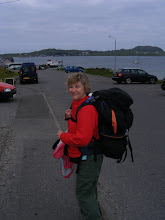I have been giving a lot of thought to the readings from week five on the topics of human liberalism and structuralism. I have concluded that I am the product of these theories. Yeah, I really am that old. I entered the public school system in 1951 and graduated from high school in 1964. The emphasis on writing was content, character, and motive. There was, a beginning, a middle, and an end. Aristotle gave us this structure, and we did not deviate. Description was emphasized, words mattered-linguistics, as Saussure pointed out, was relational. We mastered the dictionary to find the precise nuance. Roget's Thesaurus was indispensible. There was an anxiety, as Barry points out, "that the language will express things we hadn't intended, or convey the wrong impression, or betray our ignorance, callousness, or confussion" (60). These were the theories I passed on to my students through the mid-1970's.
But there was an under-current taking place that opened up a different mind-set which are reflected in this week's readings. Although modernism was influencial in the 1920s, it enjoyed a resurgence in the 1960s. There was a shift as Barry states, from "how we see rather than what we see" (79). Modern art, Danish modern furniture, geometric forms in architecture did permiate my culture. Lotman stated in last week's readings, "Thus, it is not just literary texts which take part in the development of literature" (105).
These were not welcome developments, and I would equate this unsettling to to Jacques Derrida's observation that "Perhaps something has occurred in the history of the concept of structure that could be called an 'event'" (115). The center no longer existed.
I experienced post-structuralism and postmodernism. I saw it first-hand on a cultural and social level as I lived through the decades of change. I also found that what I thought I knew about writing was no longer valid. The beginning, middle, and end approach was passe in graduate school of the twenty-first century. Forget the author who was now dead-it was all about a text which could be deconstructed in which "language doesn't reflect or convey our world but constitures a world of its own, a kind of parallel universe or virtual reality" (Barry, 72).
Fascinating and frustrating concepts for this author who was taught form and language were the key to successful writing.
Saturday, September 26, 2009
Subscribe to:
Post Comments (Atom)

I think I grew up on the cusp of the time and movements you are talking about - I was a little, little girl in the Sixties, but by the time the Seventies hit, experimentation was everything.
ReplyDeleteStarting, for me, with The Beatles' White Album, the world of art (music, books, black-light posters) was all about pushing boundaries and thinking outside of that box.
I rejected the "classic" literature on which my mother weaned me Austin, The Brontes) in favor of Pop Culture (Stephen King, Alice Hoffman), until a couple of years ago. I ran across my old, old copy of Jane Eyre and found myself easily transported once more.
I think deconstruction is a good thing when it helps us to appreciate the beautiful possibilities inherent in construction.
I think it's interesting that you chose to say, "The center no longer existed." Are you implying that the center (whatever that may be) ceased to exist or that it was discovered that the center never existed? Does an "event" de-center a non-post-modernist or does it act as the center? I'm interested to hear what you think about that, Marilyn.
ReplyDeleteAndrew, perhaps a more accurate statement would be, a universal center no longer existed; something that could be counted on and recognized by the majority. From my life experience, I have seen a "de-stabilizing" in "how we see". What can we trust? Apparently, not even the words we speak or write. Isn't that what Rod Sterling was all about?
ReplyDelete